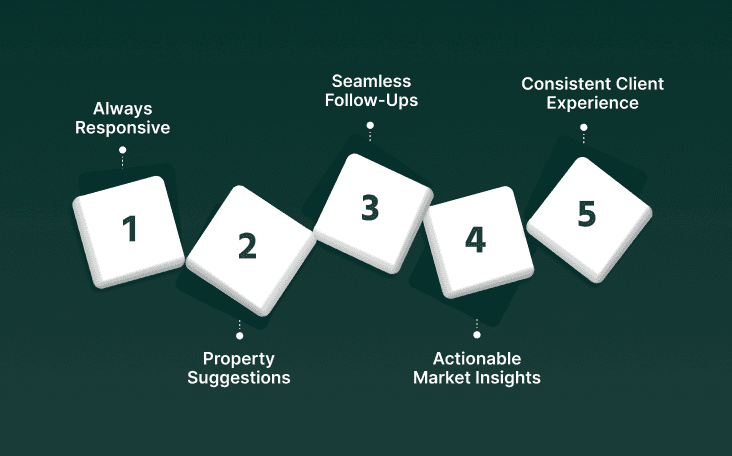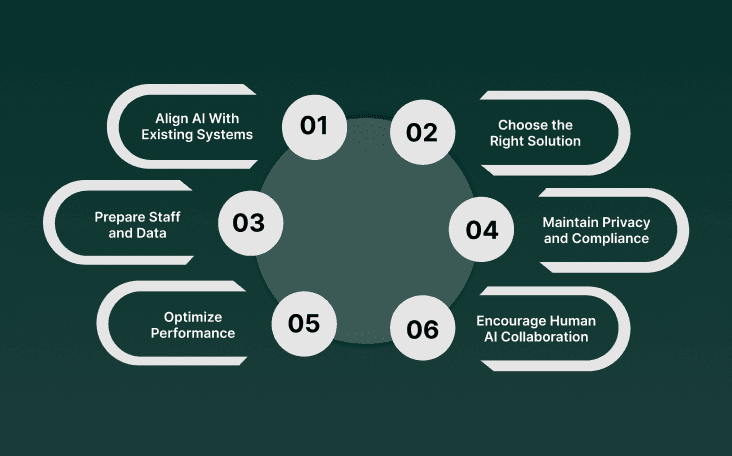Explore how conversational AI for real estate is transforming property searches, virtual tours, and client interactions. Discover the future of home buying today.

Prithvi Bharadwaj
Updated on
December 26, 2025 at 11:28 AM
Buying or renting a home rarely starts with a phone call anymore. Most journeys begin online, with listings, chats, and virtual tours replacing the old habit of walking into an office.
This shift has prompted real estate firms to rethink how they connect with clients. More than 72% of property owners and investors now plan to increase spending on AI-powered tools, showing how central technology has become to modern real estate.
At the center of this change is conversational AI: Chatbots, voice assistants, and messaging tools that talk to clients in plain language. They answer questions instantly, book viewings, and even help buyers refine their search, creating a seamless bridge between curiosity and commitment.
For agents and brokers, the upside is clear. Quicker responses to leads, stronger engagement with listings, and valuable insights gathered before the first meeting. This article explores how conversational AI is reshaping real estate experiences, from lead generation and virtual tours to client service and beyond.
Key Takeaways:
Property searches now begin online, making fast, clear, and interactive client communication critical in real estate.
Conversational AI enhances efficiency by handling inquiries, guiding buyers through property options, and gathering valuable insights for agents.
Seamless integration into existing systems, along with staff training and compliance focus, ensures practical adoption without disrupting workflows.
Future innovations like predictive recommendations, VR/AR tours, and hyper-personalized experiences are setting new standards for client engagement.
5 Benefits of Conversational AI in Real Estate

Conversational AI is becoming the backbone of how professionals attract, engage, and retain clients. From instant replies to richer data, it transforms routine interactions into opportunities for stronger connections and faster deals. Tools range from chatbots to AI voice assistants, giving buyers multiple ways to interact in real time.
Here are five ways it’s changing the game for agents and brokers today:
1. Always Responsive
A client searching for homes doesn’t wait until office hours. With conversational AI, every inquiry receives an immediate reply, whether it’s scheduling a showing or answering a basic question. That constant availability keeps potential buyers engaged instead of drifting to a competitor.
2. Smarter Property Suggestions
Rather than scrolling endlessly, users can describe what they want (“two-bedrooms near good schools under $70K,” for instance), and conversational AI personalizes options in real time.
It can also guide them through virtual tours, pointing out key features as they move through each space.
3. Seamless Follow-Ups
The days of missed emails and forgotten callbacks are fading. Conversational AI can send customized reminders, confirm appointments, and check in after a viewing. Clients feel supported, while agents gain time to focus on negotiations and closing.
4. Actionable Market Insights
Every conversation provides signals about what buyers value most. From preferred neighborhoods to must-have features, this data gives brokers a sharper view of market trends.
With those insights, agents can adjust how they position properties and even guide sellers on what resonates with buyers.
5. Consistent Client Experience
Moving from an online chat to a phone call and later to an office visit often creates gaps in communication. Conversational AI closes those gaps by keeping interactions uniform across platforms.
Also Read: What features should real estate companies look for in a voice agent?
Together, these benefits show why conversational AI is becoming integral to how real estate businesses operate. Next, let’s explore key areas where it’s making the biggest impact in real estate today.
Key Applications in Real Estate
Real estate interactions are no longer limited by location or time. Today’s buyers can explore, compare, and make decisions from anywhere, and technology is enabling more vibrant and personalized experiences than ever before.
Here are some of the most impactful ways this technology is being applied in real estate today:
Virtual property tours that feel personal: AI guides can walk potential buyers through homes, highlighting details based on their interests. For example, a user can ask to see the kitchen first or focus on outdoor spaces, making remote tours interactive.
Automated lead qualification and scheduling: Instead of waiting for an agent to respond, AI can ask follow-up questions, gauge interest, and automatically book appointments.
Multilingual chat support for diverse clients: Buyers come from multiple backgrounds, and AI can effortlessly switch languages during chats. This ensures a smooth experience for everyone, from local buyers to international clients exploring properties remotely.
Customer data insights for smarter outreach: Every interaction, questions asked, features clicked, preferences shared, helps agents understand client priorities. These insights guide targeted recommendations, personalized marketing, and better positioning of listings.
Understanding how AI is applied is just the first step. To get real value, real estate teams need to integrate these tools into their daily operations effectively.
Integrating Conversational AI Into Real Estate Workflows

Integrating conversational AI into real estate operations requires thoughtful planning and execution. Here's how professionals can approach this transformation:
1. Align AI With Existing Systems
Instead of forcing a new workflow, AI works best when connected to current platforms like CRMs, property databases, and email marketing tools. This ensures leads, messages, and property data flow seamlessly between systems without extra manual effort.
2. Choose the Right Solution
Not every firm needs a custom-built AI. Ready-made platforms offer fast setup and proven features, while bespoke solutions allow fine-tuning to match unique business models. Assess long-term needs and the level of customization required before deciding.
3. Prepare Staff and Data
AI’s effectiveness depends on clear, accurate information. Staff should be trained not just to use the system, but to understand how to input property details, tag leads, and handle exceptions.
4. Maintain Privacy and Compliance
Client trust is essential. Real estate teams must handle personal information according to local data protection regulations, including proper storage, encryption, and consent protocols, especially when storing financial or identification documents.
5. Monitor and Optimize Performance
Once AI is live, ongoing monitoring is critical. Track response times, client engagement, and lead conversions to identify patterns. Fine-tuning prompts, workflows, and integrations ensures the system grows smarter and more helpful over time.
6. Encourage Human-AI Collaboration
AI handles routine queries and data gathering, but agents still provide judgment and relationship-building. Define clear boundaries where AI supports human decision-making, so agents can focus on high-value interactions without losing personal touch.
Also Read: AI Tools In Customer Support: Top 10 Ways To Use Them
Voice AI in real estate adds another layer to these capabilities, enabling conversations that are quicker, more natural, and closer to how clients interact with real agents.
Powering Real Estate Engagement with Real-Time Voice AI
Property inquiries often come at unpredictable hours, and a slow response can cause serious buyers to turn to competitors. Fast, natural conversations build confidence from the very first interaction.
Smallest.ai’s real-time voice agents enable firms to engage clients instantly, with natural conversations that replicate the responsiveness of a live agent. Core capabilities include:
Instant lead response: Calls and inquiries are answered in under 100 milliseconds, keeping potential buyers engaged before they move on.
Automated scheduling: Viewings, callbacks, and follow-ups are handled seamlessly, reducing the load on busy real estate teams.
Multilingual support: Agents can interact in multiple languages, making property engagement accessible to diverse client groups.
Compliance-ready deployments: Options for secure on-premise or edge setups support the sensitive financial and personal data involved in real estate transactions.
By combining speed, accuracy, and security, Smallest.ai makes conversational AI a practical tool for real estate professionals focused on improving client engagement and closing deals faster.
Future Trends in Conversational AI for Real Estate

As the real estate market becomes increasingly competitive, conversational AI is moving beyond basic automation. The next wave of innovations is focused on anticipating buyer needs, creating immersive experiences, and providing actionable insights that directly influence decision-making.
Professionals who adopt these trends early can guide clients more intelligently, showcase properties in richer ways, and make data-driven moves that align with shifting market dynamics.
Key emerging trends include:
Predictive property recommendations: AI analyzes buyer behavior, local trends, and historical sales to suggest homes clients are likely to consider, helping agents engage proactively.
Immersive VR/AR experiences: Virtual and augmented reality tours are no longer a novelty. They help buyers understand layouts better, and 43% of agents say clients now consider them significantly more important when viewing listings.
Hyper-personalized buyer journeys: AI tracks preferences and behaviors to customize communications, listing suggestions, and follow-ups for each individual client.
Advanced lead scoring: Algorithms evaluate engagement patterns to prioritize high-potential buyers, increasing efficiency and improving conversion rates.
Real-time market trend analysis: AI identifies shifts in demand, emerging neighborhoods, and pricing changes, enabling timely and strategic decisions.
Voice-enabled property search: Buyers can interact via voice commands to find listings, schedule viewings, or ask questions, enhancing convenience and accessibility.
Also Read: How Voice AI Platforms Are Reducing Contact Center Expenses
These trends show how conversational AI is shaping a future where property searches are smarter, more interactive, and more personalized than ever before.
Conclusion
Conversational AI is making client interactions faster, more relevant, and data-informed, allowing agents to guide buyers with clarity and confidence.
Success depends on thoughtful adoption. Training teams, integrating technology seamlessly, and utilizing insights to anticipate client needs. When done well, AI complements human expertise, enhancing engagement without replacing the personal touch.
Turning these capabilities into real-world results requires tools that manage real-time conversations smoothly. Smallest.ai’s Voice AI Suite enables instant responses, guided property searches, and actionable insights, while keeping interactions personal and seamless.
See how Smallest.ai makes client interactions smarter and smoother - book a demo today!
FAQs
1. Can conversational AI help improve client trust in virtual property tours?
Yes. By providing accurate, on-time answers during virtual tours and explaining property features clearly, AI can make remote buyers feel more confident and informed, building trust without needing a physical walkthrough.
2. How does conversational AI support real estate marketing campaigns?
AI can track client interests and engagement patterns across listings and interactions, enabling teams to customize marketing messages and promotions to specific segments.
3. Can AI assist in property valuation or investment decisions?
Conversational AI, combined with analytics, can provide insights into pricing trends, neighborhood demand, and comparable sales. While it doesn’t replace professional appraisals, it helps clients and agents make more informed decisions quickly.
4. Is conversational AI effective for new or first-time homebuyers?
Yes. AI can guide inexperienced buyers step-by-step, answer frequently asked questions, and clarify complex real estate terms. This makes the property search process smoother and less intimidating.
5. How does conversational AI handle multi-location property portfolios?
For agencies or clients managing multiple properties across cities or regions, AI can consolidate inquiries, track interest by location, and highlight which properties are attracting the most engagement.


